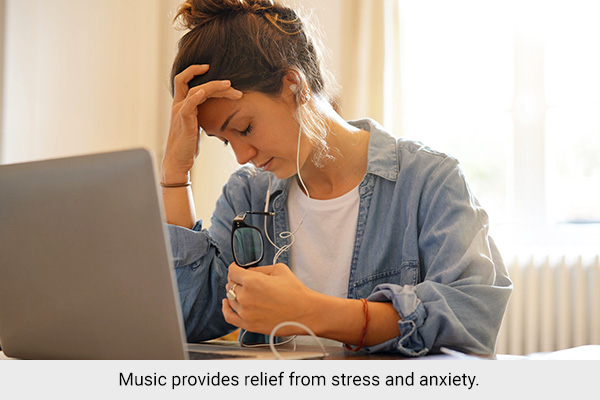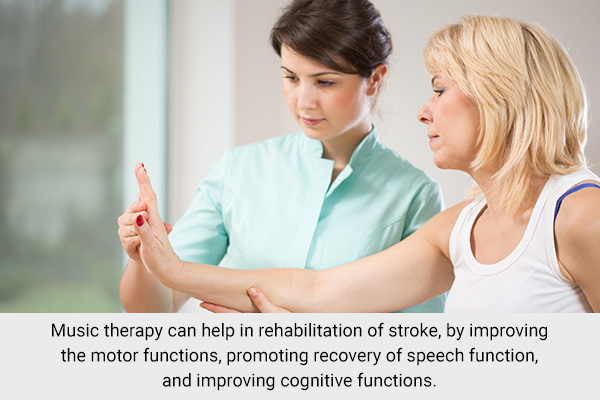In this article:
“Music is a therapy. It is a communication far more powerful than words, far more immediate, far more efficient.” – Yehudi Menuhin

Indeed, music has a very good therapeutic potential. Music has been part of human life in every culture since ancient times. Music is not only an art form providing entertainment but also functions as a medicine that heals the body, mind, and soul.
Many researchers and health experts are studying the healing effects of music.
Health Benefits of Music
Here are some health benefits of music.
1. Aids in the treatment of dementia
Dementia is a progressive deterioration of neurological function, leading to impairment in cognitive, behavioral, and social functions. Though pharmacological interventions are available, these have limited use in mitigating the symptoms and have many side effects.
In recent times, music therapy has been proposed as an alternative treatment to slow down cognitive decline. (1)
In a 2017 study conducted on 42 patients suffering from Alzheimer’s disease, four sessions of music therapy improved the cognitive, psychological, and behavioral alterations. (2)
2. Reduces stress and anxiety

Music provides relief from stress and anxiety. A 2020 study and meta-analysis reported stress reduction due to musical interventions through a reduction in heart rate and hormonal levels in the study participants. (3)
An earlier study has attributed the reduction in anxiety and stress due to music to a reduction in cortisol levels. (4)
3. Improves immune function
Listening to music can boost your immune system’s functioning. An article published in 2018 in the International Journal of Oncology Research reported an increase in the immunoglobulin IgA and IgG levels and increased activity of the enzyme carbonic anhydrase. (5)
IgA is the antibody in the mucosal surfaces of the body and keeps the cells healthy, and IgG is the antibody found in the blood and other circulating fluids of the body. Carbonic anhydrase is a zinc-containing enzyme responsible for immunity in the oral mucosa.
4. Decreases pain
Music therapy helps reduce pain and anxiety during painful surgical procedures.
In a 2016 study on human volunteers undergoing surgical procedures, 87% of the participants reported a reduction in pain upon musical intervention. (6)
In a 2016 study conducted on cancer patients undergoing palliative care, a single session of music therapy significantly reduced cancer pain. (7)
5. Plays a role in stroke rehabilitation

Many studies have shown that music therapy can help in the rehabilitation of patients who had stroke, by improving motor functions, promoting recovery of speech function, and improving cognitive functions. (8)
Music therapy has also proved to be useful in improving gait in patients who had a stroke, allowing them to carry out motor functions effectively. (9)
6. Helps in the treatment of schizophrenia
The clinical manifestation of schizophrenia consists of a diverse set of syndromes, and the search for new approaches to treating this mental disorder continues. Among the many promising therapies to treat schizophrenia, music therapy has shown beneficial effects.
Neuroimaging studies have shown that some areas of the brain affected by schizophrenia respond positively to music. In addition, music therapy has been reported to lead to an elevation in the levels of neuromodulators in the brain such as dopamine, endorphins, and nitric oxide, leading to an alleviation of the symptoms of schizophrenia. (10)
7. Helps in the treatment of depression
Depression is a mood disorder that is fairly common and is characterized by loss of social function, reduced quality of life, and increased mortality.
The use of music therapy to treat patients with depression resulted in an improvement in symptoms, according to a 2017 review article published in Frontiers in Psychology. (11)
8. Helps in improving memory

Listening to music while learning or memorizing something has been shown to aid memory and help effective recall. Music has been proven to aid learning and improve memory.
A study published in a leading research journal, Nature, reported that listening to words encoded in musical notes improved the participants’ ability to recall the words significantly. (12)
9. Reduces high blood pressure
The relaxing effect of music has been recognized in many cultures since ancient times. However, it is only in recent times that scientific evidence validating this has been obtained.
Results of a recent randomized control trial published in 2020 in The Journal of Clinical Hypertension reported that relaxing music lowered the blood pressure and heart rate in prehypertensive young adults. (13)
In this study, the observed physiological effects were attributed to the effect of music on the limbic system by slowing down brain activity, which led to psychological changes, which in turn influenced the mood and caused the lowering of blood pressure and slowing of heart rate. (13)
In an earlier meta-analysis, it was shown that music therapy leads to a reduction in systolic blood pressure, diastolic blood pressure, and heart rate in a variety of clinical settings. (14)
10. Aids in the treatment of eating disorders
Anorexia nervosa, bulimia nervosa, and binge eating disorder are the three main eating disorders. Music therapy has proved to be beneficial in the treatment of all three eating disorders. (15)
Can Music Therapy Benefit Children?
Music therapy has been very useful for children. Music helps a child develop their communication skills and promotes concentration and listening skills.
Music also helps the child to find ways to express feelings creatively and constructively beyond their behavior. It may facilitate in expressing their emotions. (16)
What Is the Impact of Music Therapy on the Fetus?
A large-scale study was conducted at the Beth Israel Medical Center’s Louis Armstrong Center for Music and Medicine. In this study, 272 premature babies in NICUs were exposed to three types of music: a lullaby, an instrument that plays sounds similar to the womb (an ocean disk), and a soft drum that simulates heartbeat sounds (a Gato Box).
The study concluded that the sound of the musical instruments helped increase alertness in the babies and calmed them down. The lullabies helped increase parental bonding and also improved their feeding and sucking patterns. (17)
Most-Asked Questions
What is music therapy?

Music therapy is the clinical and scientific evidence-backed use of musical interventions to achieve customized and individualized goals within a therapeutic setting, administered by a qualified professional.
What is the role of a music therapist?
A qualified music therapist assesses the emotional state, physical health, communication skills, and social functioning of the patient and designs specific music sessions for the patient and patient groups.
Where do music therapists work?
Music therapists work in hospitals, psychiatric clinics, rehabilitation centers, senior citizen homes, schools, and private practice.
Who can benefit from musical therapy?
Almost everyone can benefit from music therapy. But the people who derive the most benefit are children, adolescents, and the elderly with mental health issues, people afflicted with dementia and Alzheimer’s disease, and people with substance abuse problems, brain injuries, and acute or chronic pain.
Final Word
Music is universally present, and each cultural group has its own characteristic music. The power of music to calm the mind and encourage the healing of different health issues has been acknowledged since ancient times.
Historical evidence point out that music was used as therapy in Arab, Chinese, Indian, and Greek civilizations. Ancient Egyptians also use music for the healing of the sick.
In recent times, there has been a revival of interest in using music therapy for the treatment of chronic health issues, and the healing effects of music are being documented in the current scientific literature. It is hoped that, in the future, musical therapy becomes a viable option.
Einstein once said, “If I were not a physicist, I would probably be a musician. I often think in music. I live my daydreams in music. I see my life in terms of music.”
- Was this article helpful?
- YES, THANKS!NOT REALLY


